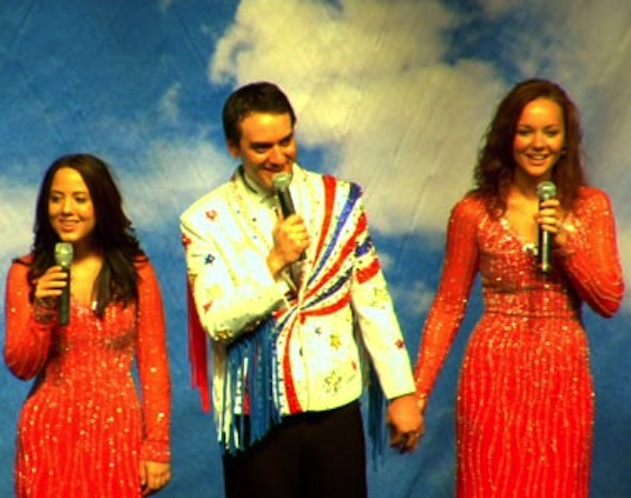Film Review: “We Always Lie to Strangers” — One Part of America, Singing
These are good people who have grown up playing country and pop music and are committed to giving the people what they want.
We Always Lie to Strangers, directed by A.J. Schuack and David Wilson. Presented by The DocYard at the Brattle Theatre, Cambridge, MA, Monday (December 1) at 7 p.m.

A scene of happy Americana from “We Always Lie to Strangers.”
By Tim Jackson
There have been some terrific documentaries lately chronicling the trials and tribulations of late 20th century music: Twenty Feet From Stardom, Sound City, Muscle Shoals, and Boston native Beth Harrington’s festival film The Winding Stream, which honors the Carter Family’s contribution to the roots of American country music. Today, country takes many forms: the whiskery country of Willie Nelson, the “bro-country” of Blake Shelton, Tim McGraw’s cowboy writ-large, twanging songs with lyrics about liquor, love, losing your lady, and standing by your man. Allegedly, this is the sound of America singing. But nowhere is the stereotype ladled out with as much cornpone as in Branson, Missouri, a town that is a theme park dedicated to country music entertainment. The so-called “live music capital of the world” with 10,000 residents generates an astounding 2.9 billion dollars from 7.5 million tourists each year.
Do the impudent snobs (in William Safire’s phrase) of the East Coast really know what goes on there? I had a pretty good idea what was on the menu: white bread, conservative-leaning Christian Americana sung by talented performers who lacked a certain sophistication. My notion was pretty much confirmed by AJ Schnack and David Wilson’s film We Always Lie to Strangers. The documentary examines (with respect) four families of Branson whose lives are dedicated to entertaining the heartland of America week after week, year after year. These are good people who have grown up playing country and pop music and are committed to giving the people what they want. In the words of Branson’s Republican mayor Raeanne Presley, who could give the silver-tongued Sara Palin a run for her money: Branson “is about core values and culture. The first {value} is hospitality and then those three things we all hold dear: God, and country, and family.”
The filmmakers spent five years accumulating footage and interviews. The payoff is a non-clichéd look at a business riddled with clichéd and lowbrow entertainment. As a critic, I am thrilled to see the dedication and skill of the performers. As a musician, Branson is my worst nightmare. As an American, I’m a speechless at the mobs who gobble Branson’s air-brushed patriotism up. However, as a viewer, I must confess that the personalities in the film are consistently engaging. Chip Holderman, who is first seen rehearsing a Branson version of The Village People’s “YMCA,” is gay. He is well spoken, hard working, and not shy about suggesting some of the expected difficulties of living as a gay man in Branson. His partner in life and entertainment is Ryan Walton, who tells us: “There’s this huge gay population and yet it’s the Bible Belt. I don’t know where someone came up with the idea of putting those two together.” Actually, it makes a lot of sense considering the camp quality of some of the Branson showbiz material, but the ironic conjunction is not elaborated on in We Always Lie to Strangers.
We’re introduced to The Lennon Brothers and the Lennon Sisters. The sisters, who appeared every week on The Lawrence Welk Show over fifty years ago are now in their sixties and seventies. They still perform in Branson as an extended family with their spouses. Says Bill Lennon of the clan: “My brothers and our spouses, we’re all Democrats. Besides being able to sing we were taught we had to speak out if we felt a certain way.” The other focus of the film is the Presleys clan, the first family of Branson. Raeanne, a resident since 1968, married Steve Presley who, along with his brothers, perform at the Presley Music Theater. The patriarch of the four generations, Lloyd Presley, died during the making of the film. We hear from his last interviews.
There are air shows, merchandise tables, and struggling singers who have found satisfaction and careers in Branson and are working to keep a version of their dream alive. It’s certainly not all fun and games; this is serious show business, which means hard work and commitment. The filmmakers highlight the performances, but don’t stint at capturing the human dramas. These are stories of hope, dreams, and life passing by, marriage, death, friendships, and families. These singers are significant piece of the crazy quilt of America. At the very least, They Always Lie to Strangers proves that condescending folk stories about Southern hayseeds and hillbillies are just so much horse feathers. I can’t say I have much tolerance for the shows of Branson, but it’s satisfying to take an empathetic look at the real lives behind them.
Tim Jackson is an assistant professor at the New England Institute of Art in the Digital Film and Video Department. His music career in Boston began in the 1970s and includes some 20 groups, many recordings, national and international tours, and contributions to film soundtracks. He studied theater and English as an undergraduate and has also has worked helter skelter as an actor and member of SAG and AFTRA since the 1980s. He has directed a trio of documentaries: Chaos and Order: Making American Theater about the American Repertory Theater, and Radical Jesters, which profiles the practices of 11 interventionist artists and agit-prop performance groups. His third documentary, When Things Go Wrong, about the Boston singer/songwriter Robin Lane, with whom he has worked for 30 years, has just been completed. He is a member of the Boston Society of Film Critics. You can read more of his work on his blog.
Tagged: Branson, Brattle Theatre, Country Music, documentary, Presleys, The DocYard, The Lennon Brothers, the Lennon Sisters
